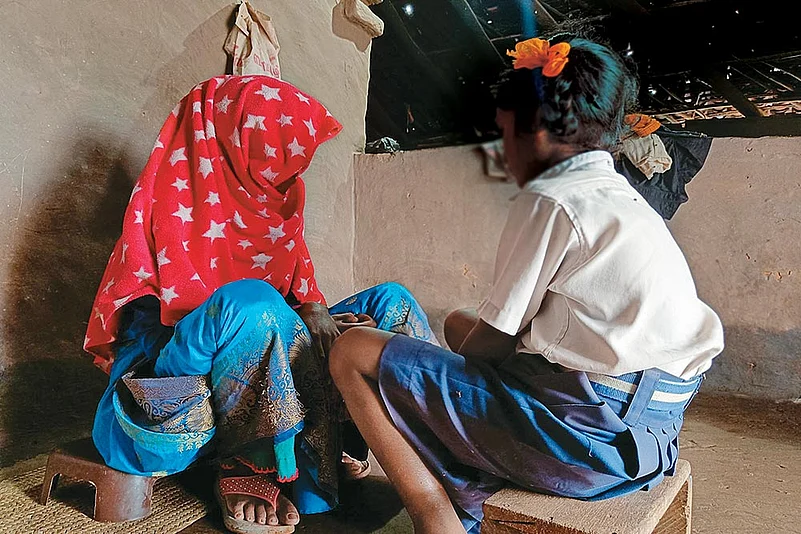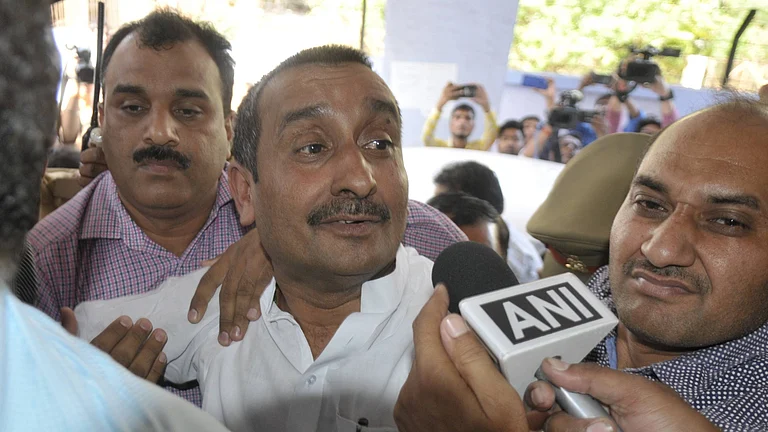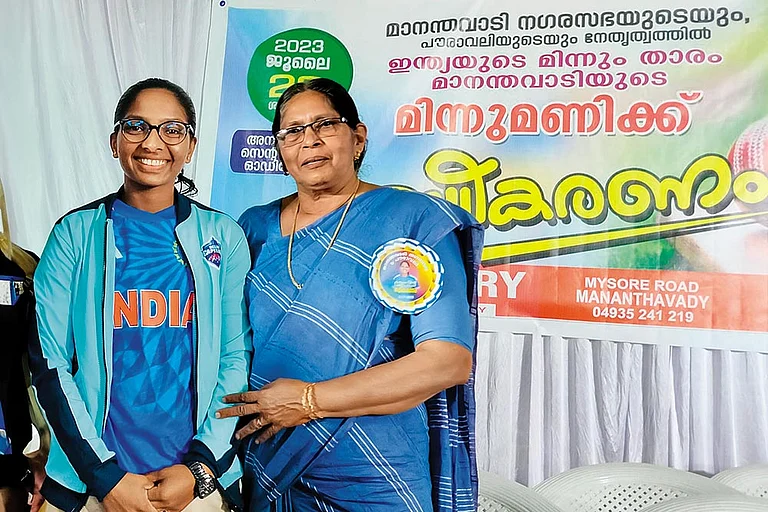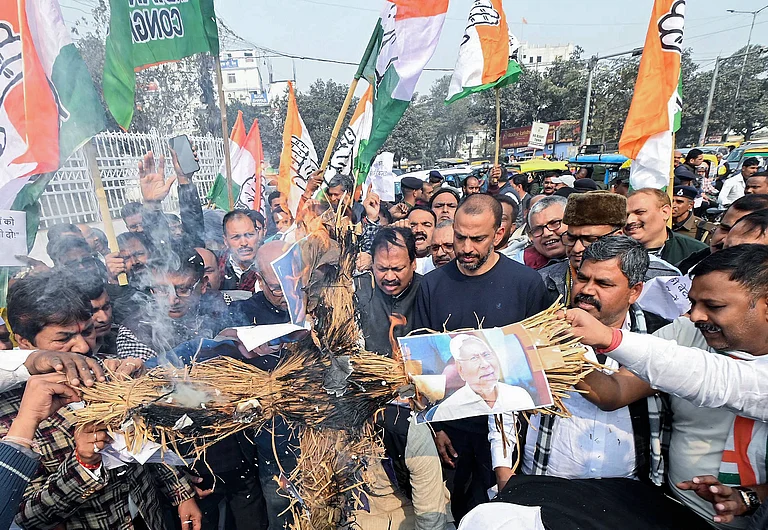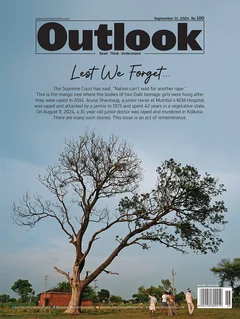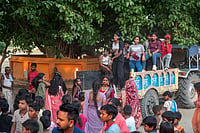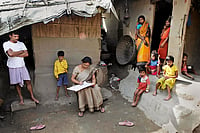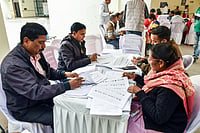On a rainy August morning, we met Anjali at her mud house in an Adivasi village in Latehar, Jharkhand. She had just returned from school and was still in her uniform. A look of trepidation appeared on her face. Turning to her mother, she asked: “Who is he?”
After the May 13 incident, she gets anxious any time she sees a stranger. Her innocence encourages one to hope that the shadows of fear will recede with time, but will the scars inside heal? Nine-year-old Anjali knows that “a dirty thing” was done to her. She clearly remembers everything from the day of the incident. Understandably, her family does not want her to relive it.
“He gave me biscuits. Then he said he would give me ten rupees if I came out to pee. He led me into the jungle, removed my clothes, and started doing dirty things. He told me not to make noise. When I started shouting, he silenced me. He then took me to the fields and did dirty things again.”
Anjali goes silent. After eight to ten seconds, she resumes, “I was hurting a lot, so I said to him that I wanted to go home, but he took me to his house.”
On May 13, 27-year-old Arpan Kujur [the accused] was with Aarti's three children for hours in their mud house, which is near the paved road, with the door locked from within. When the mother returned from working in the garden at four in the evening, the door was still locked. She had to knock for a long time before the children opened it. Seeing Kujur lying on the mat inside, Aarti was shocked and she began yelling abuses at him, after which he went out quickly.
Aarti says, “But he continued to loiter around the house. When we called the three children for dinner, we found that Anjali was not there. Our younger girl said that her sister had gone out to pee. When a long time had passed and she had still not returned, the whole village began searching for her. The next day my daughter was found in his house.”
There was deep anger in the village over the incident. The accused was caught, beaten, and later handed over to the police. The victim's family has not demanded that he be hanged; instead, they want him to be jailed for life so that he may repent his crime till his last day.
Figures from the National Crime Records Bureau reveal that in 2022, 1,298 rape cases were registered across the state.
Both the victim and the accused in the case are tribals and belong to the same village. Kujur's house, where only his mother lives currently, is a short distance from the victim's house. The night he took Anjali with him, his mother was at home, something she accepts in her conversation with Outlook. But her reaction to the allegations against her son reflect a misconception that society has towards the rape of a minor girl: she says that if her son had raped her, the girl would not have survived.
A chargesheet has been filed in court by the Mahuadanr police station. The investigating officer (IO), Bandhan Tirkey, told Outlook that action was taken by registering a case under sections 4, 6, and 8 of the Protection of Children from Sexual Offence (POCSO) Act and 376 (2) and (5) of the Indian Penal Code (IPC). During the investigation, the allegations were found to be true.
Sections 4 and 6 of the POCSO Act are invoked in the case of penetrative sexual assault and aggravated penetrative sexual assault. These sections carry provisions for life imprisonment and even capital punishment.
This is far from the only case of sexual assault of a minor girl in Jharkhand. Investigation is on in another case pertaining to two minor tribal girls that took place under the purview of the same police station on July 4. The police have registered a case under relevant sections of the IPC and the POCSO Act and are searching for the absconding accused. Data from before and after this incident show that many such instances of rape of underage girls have come to light in the state.
In fact, Jharkhand is currently placed third in the country for rapes of minor girls. Figures from the National Crime Records Bureau reveal that in 2022, 1,298 rape cases were registered across the state. Eight of the ten states with the highest number of registered rape cases are tribal-dominated, and Jharkhand is seventh among them. The victims in these states are mostly tribal girls and women.
Over the last few years, the graph of rape in Jharkhand has climbed significantly. From 2020 to June 2024, 7,431 rape cases were registered in the records of the Jharkhand Police, i.e., an average of 4.5 rape incidents daily. The capital Ranchi has emerged as something of a “rape hub”. It saw the highest number of incidents, 972, or 18 incidents monthly.
We need to bear in mind that these are only the figures recorded by the police. In most cases of sexual violence against women, no report is filed. In fact, in Bihar, Uttar Pradesh, and Jharkhand, the rate of reporting is less than 0.5 per cent.
Take, for instance, the 2018 case of the alleged rape of a 44-year-old tribal widow, Pratima, in Narayan Soso, Block Angara, 25 km from Ranchi. The entire investigation in this case has been called into question. It has been over five years since the time of the alleged incident. During this period, the matter passed from the Angara police to the Senior SP and the Child Welfare Committee, but no FIR has been filed till date.
Pratima alleged that two people (Lalku Kumhar and Rajkumar) entered her broken mud house and forced themselves upon her. The next morning, when she told the neighbours and relatives about the incident, they did not believe her. Instead, they blamed her for what had happened. But eventually, everyone except the accused party came to accept that Pratima had been raped.
According to the police, though the matter was brought to the police, no one lodged an FIR. Pratima also got pregnant following the incident. The police tried to “settle” the whole matter by saying that the accused had agreed to take responsibility for the child.
The incident came to light when the child (born on December 2, 2018) was sold off. Following media coverage, the Child Welfare Committee intervened. A committee was formed to investigate the matter under the leadership of the then DSP of Silli, Chandrashekhar.
Ten years ago, Pratima lost her husband to illness, after which she started working as a wage labourer to support her three children. When news broke of the alleged rape and child sale, she and her children were living in a house that had collapsed from all sides and had no doors. Now even this semblance of a shelter is gone with the debris flattened into the ground. She passes the night inside the government toilet in the field, built at a cost of ₹12,000.
For Pratima, her niece-turned-daughter-in-law and former ward member Shanti Devi has been a source of strength and support throughout. Devi approached the police, the panchayat, and anyone else who would listen, in search of justice for Pratima. She tells Outlook that a police case was filed, and the accused taken into custody. When we tell her that according to the police, neither of these things happened, she laughs. She says that instead of spending their money on police and legal proceedings, the accused gave it to Pratima. Shanti believes that what happened was wrong, but since this was the men’s first mistake, they were let off with only a warning not to repeat it.
What we learnt from the DSP office about the investigation into this case raises questions about the propriety of the process followed. The investigation was conducted without an FIR, and no one was found guilty. On the contrary, it was said in the report that the woman had physical relations with two people of her own free will and later got pregnant. She birthed the child and gave it away to someone for upbringing.
Reshma, activist and Jharkhand state coordinator for the Association for Advocacy and Legal Initiatives Trust, points out some of the procedural lapses in the police investigation process. If the woman had consensual sex with the two people who were accused of rape, then how did the investigation reach that conclusion without an FIR being filed, she asks. As per rules, she says, an FIR should have been filed before the investigation. And in a serious case such as this, the police should have taken suo motu cognisance and filed the FIR itself.
Reshma believes that the woman has been pressurised to go silent. According to her, there is a provision under Section 69 of the IPC to lodge an FIR in any such situation.
Jharkhand Chief Minister Hemant Soren called the rape of tribal women in Manipur a black chapter in the history of the country. However, when it comes to curbing the 4.5 rape cases registered every day in his own state, he has been singularly unsuccessful.
Jharkhand BJP spokesperson Pratul Shahdev says, "A large number of tribal and Dalit girls have been the victims in the rape incidents that have occurred during the tenure of Chief Minister Hemant Soren. The CM repeatedly says that this is a government of tribals, but till date he has not managed to form a Scheduled Tribes Commission for them. The Jharkhand Women's Commission has not been reconstituted either. Before pointing fingers at other states, the CM should look within to assess his own seriousness about women’s issues."
There are a number of commissions and boards in Jharkhand that have not been reconstituted or not formed in the first place. Women who have been victims of violence look to the commission for justice, but there is no one at the commission to listen to their grievances. The State Women’s Commission, meant to provide justice to the persecuted and harassed women, has been defunct for the last four years. In this time, the number of complaints pending hearing has grown to more than five thousand. Similarly, the Scheduled Tribes Commission, which works for the protection of the rights of the tribals in the state, has also not been reconstituted.
Ratan Tirkey, former member of Jharkhand Tribal Advisory Council, regards these incidents of sexual violence as marks of administrative failure. In addition to the government, he also holds the governor responsible, because the governor is the custodian of a fifth-schedule state. As such, it is his/her responsibility to summon the administration and the DJP when required, to ask why such incidents are happening with tribal women.
He says further, “For both the Congress and the JMM [the two have been ruling the state through a coalition government for the last three and a half years], animals are more important than the women of the state. That is why they did not deem it necessary to form the Scheduled Tribes Commission and the Jharkhand Women’s Commission. A more urgent matter for them was the reorganisation of the Jharkhand State Gau Seva Commission instead. This is extremely unfortunate. Our neighbouring state Bihar has a mere one per cent tribal population, but it has got a Tribal Commission. We cannot say the same for Jharkhand, though it has more than 26 per cent tribal population. The Constitution accords the Tribal Commission the status of a court. It is invested with a lot of power. The work of the commission is to hear the cases of atrocities being committed on tribals. Whenever a complaint reaches the commission, it has the right and power to summon the concerned officer or official to the court.”
(All names have been changed)
(Translated by Kaushika Draavid)
MORE FROM THIS ISSUE
A shorter, edited version of this appeared in print







